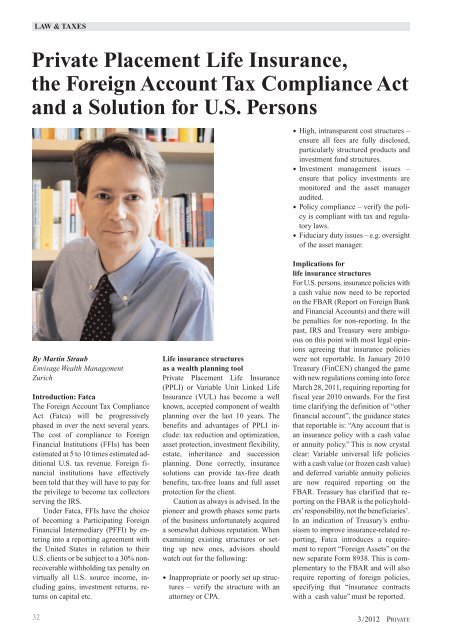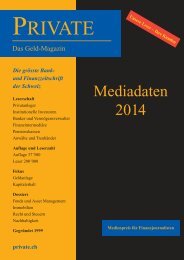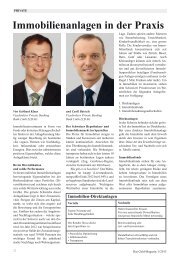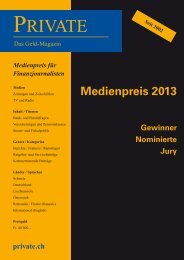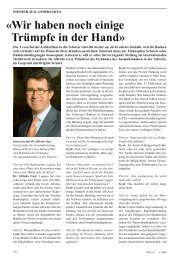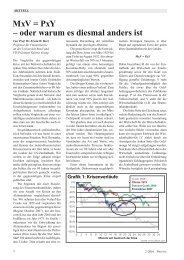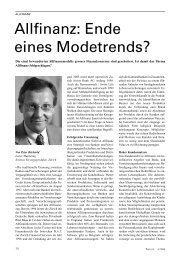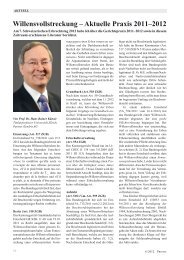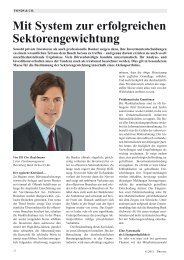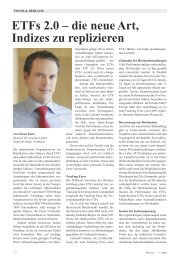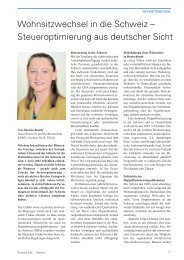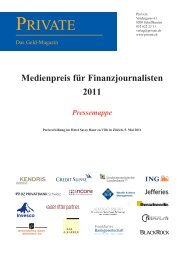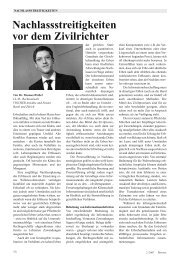PDF - Private Magazin
PDF - Private Magazin
PDF - Private Magazin
Erfolgreiche ePaper selbst erstellen
Machen Sie aus Ihren PDF Publikationen ein blätterbares Flipbook mit unserer einzigartigen Google optimierten e-Paper Software.
XLAW<br />
& TAXES<br />
<strong>Private</strong> Placement Life Insurance,<br />
the Foreign Account Tax Compliance Act<br />
and a Solution for U.S. Persons<br />
By Martin Straub<br />
Envisage Wealth Management<br />
Zurich<br />
Introduction: Fatca<br />
The Foreign Account Tax Compliance<br />
Act (Fatca) will be progressively<br />
phased in over the next several years.<br />
The cost of compliance to Foreign<br />
Financial Institutions (FFIs) has been<br />
estimated at 5 to 10 times estimated additional<br />
U.S. tax revenue. Foreign financial<br />
institutions have effectively<br />
been told that they will have to pay for<br />
the privilege to become tax collectors<br />
serving the IRS.<br />
Under Fatca, FFIs have the choice<br />
of becoming a Participating Foreign<br />
Financial Intermediary (PFFI) by entering<br />
into a reporting agreement with<br />
the United States in relation to their<br />
U.S. clients or be subject to a 30% nonrecoverable<br />
withholding tax penalty on<br />
virtually all U.S. source income, including<br />
gains, investment returns, returns<br />
on capital etc.<br />
Life insurance structures<br />
as a wealth planning tool<br />
<strong>Private</strong> Placement Life Insurance<br />
(PPLI) or Variable Unit Linked Life<br />
Insur ance (VUL) has become a well<br />
known, accepted component of wealth<br />
planning over the last 10 years. The<br />
benefits and advantages of PPLI include:<br />
tax reduction and optimization,<br />
asset protection, investment flexibility,<br />
estate, inheritance and succession<br />
planning. Done correctly, insurance<br />
solu tions can provide tax-free death<br />
benefits, tax-free loans and full asset<br />
protection for the client.<br />
Caution as always is advised. In the<br />
pioneer and growth phases some parts<br />
of the business unfortunately acquired<br />
a somewhat dubious reputation. When<br />
examining existing structures or setting<br />
up new ones, advisors should<br />
watch out for the following:<br />
. Inappropriate or poorly set up structures<br />
– verify the structure with an<br />
attorney or CPA.<br />
. High, intransparent cost structures –<br />
ensure all fees are fully disclosed,<br />
particularly structured products and<br />
investment fund structures.<br />
. Investment management issues –<br />
ensure that policy investments are<br />
monitored and the asset manager<br />
audit ed.<br />
. Policy compliance – verify the policy<br />
is compliant with tax and regulatory<br />
laws.<br />
. Fiduciary duty issues – e.g. oversight<br />
of the asset manager.<br />
Implications for<br />
life insurance structures<br />
For U.S. persons, insurance policies with<br />
a cash value now need to be reported<br />
on the FBAR (Report on Foreign Bank<br />
and Financial Accounts) and there will<br />
be penalties for non-reporting. In the<br />
past, IRS and Treasury were ambiguous<br />
on this point with most legal opinions<br />
agreeing that insurance policies<br />
were not reportable. In January 2010<br />
Treasury (FinCEN) changed the game<br />
with new regulations coming into force<br />
March 28, 2011, requiring reporting for<br />
fiscal year 2010 onwards. For the first<br />
time clarifying the definition of “other<br />
financial account”, the guidance states<br />
that reportable is: “Any account that is<br />
an insur ance policy with a cash value<br />
or annuity policy.” This is now crystal<br />
clear: Variable universal life policies<br />
with a cash value (or frozen cash value)<br />
and deferred variable annuity policies<br />
are now required reporting on the<br />
FBAR. Trea sury has clarified that reporting<br />
on the FBAR is the policyholders’<br />
responsibility, not the beneficiaries’.<br />
In an in dication of Treasury’s enthu -<br />
siasm to improve insurance-related reporting,<br />
Fatca introduces a requirement<br />
to report “Foreign Assets” on the<br />
new separate Form 8938. This is complementary<br />
to the FBAR and will also<br />
require reporting of foreign policies,<br />
specifying that “insurance contracts<br />
with a cash value” must be reported.<br />
32 3/2012 PRIVATE


